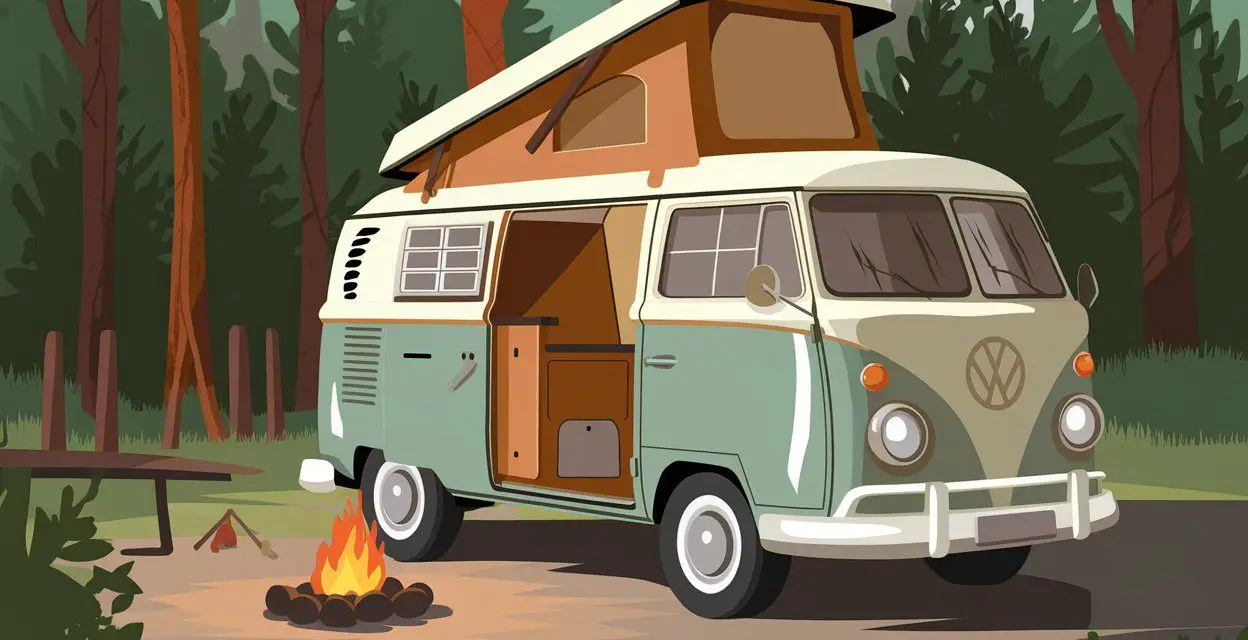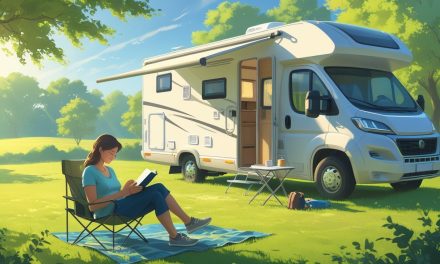Finding a spot for your van at rv parks can be confusing and stressful. Some campgrounds only accept certified RVs, while others welcome camper vans if you follow their rules. This guide breaks down everything about “Are Vans Allowed In RV Parks,” showing you what to expect, where to park, and how to avoid headaches with private campgrounds or state parks near New York City.
Stick around—these tips could save you time and trouble on your next road trip.
Key Takeaways
- RV parks have different rules for vans. Some only allow certified RVs with an RVIA stamp, while others may turn away self-built or older vans (over 10 years old), like at Saratoga RV Park.
- Many parks require special insurance (Class B RV) and proof of certification before entry; regular auto insurance is often not enough for camper vans.
- Size matters—some parks do not allow large vans or those without proper hookups. Van owners should always check each park’s policy and call ahead before their trip.
- Misunderstandings about what counts as an “RV” can cause problems; some parks still ban non-traditional vehicles like tiny homes, pop-ups, truck campers, and buses.
- Alternatives exist: van-friendly campgrounds such as Williams Corners Campground (NY), Liberty Harbor RV Park (NJ), boondocking on public land, and membership clubs offer more flexible options for van travelers.
Rules and Regulations for Vans in RV Parks
You might think parking your camper van in RV parks is as easy as pie, but state parks and private campgrounds have their own playbook. Some want proof from the Department of Motor Vehicles or ask if your rig is more like a Winnebago than a street van—so always check before hitting the road.
Requirements for RV Certification
RV parks, private campgrounds, and trailer parks often check if your van or camper has RVIA certification. This stamp from the Recreation Vehicle Industry Association means your vehicle meets strict safety and construction standards.
Many places will not let you in without it; they want to know your rig follows official rules on wiring, plumbing, fire alarms, and exits.
Getting certified is not a walk in the park for self-built vans. Some owners try going through inspection with help from companies listed at the department of motor vehicles or trusted conversion shops like Winnebago or NEC.
Parks worry about insurance risks too—if a van does not meet RV requirements, some won’t allow entry no matter how fancy it looks. “Proof beats promises every time,” as one park owner said—bring paperwork showing you passed all tests before rolling up to that gate!
Restrictions on Self-Built Vans
Self-built vans can face tough rules at RV parks. Many parks set strict guidelines for these vehicles. Some may not allow them at all, especially if they are not certified as RVs. This is important because only certified rigs often fit the park’s standards.
Some places even have age limits for vehicles, like saying units 10 years or older need special permission from the park office.
Your self-built van might also run into issues with size and connections. Each RV park has its own rules about what fits in their spots and what hooks up to their utilities. If you love that nomadic lifestyle but drive a unique van, it’s smart to check ahead.
Knowing the specific policies of each park helps you plan better when hitting the road next time!
Age Limits for Vans and RVs
Moving on from restrictions, age limits play a big role in RV parks. Many parks have rules about how old your van or RV can be. For example, at Saratoga RV Park, if your vehicle is ten years old or older, you need approval from the park office.
This means you might want to check with them before showing up.
You may find some parks that welcome all ages of vans and RVs. Others could have strict cutoffs. It’s best to call ahead and ask about their specific policies if you own an older vehicle.
Knowing these details helps avoid surprises when trying to park your camper van or motorhome for the night.
Insurance Requirements for Park Entry
Insurance is a big deal for entering RV parks. Most regular auto insurance won’t cover modifications made to your van. You need Class B RV insurance if you have a custom camper van.
This type of coverage protects you better and meets park rules.
Check with insurers like Progressive, Roamly, or Geico for options. They understand the needs of van campers and can help find the right policy for you. Having proper insurance is key; it keeps you safe while enjoying life on the road in RV parks or private campgrounds.
Factors That Determine Van Accessibility in RV Parks
When you think about using a van in an RV park, many rules come into play. Each park has its own policies. Your van’s size matters too. Some parks might only accept larger vehicles or RVs with certain hookups.
Plus, local laws can also affect access for your ride. Finding the right spot takes some digging! Want to learn more? Keep reading!
Park-Specific Policies
Each RV park has its own rules. You must check these before you visit. Some parks allow vans, while others do not. For example, Saratoga RV Park prohibits tiny homes, truck campers, buses, vans, pop-ups, and tents.
This means if you have a van or similar vehicle, it won’t be allowed there.
Policies can vary widely from one park to another. Some parks may open their doors to all types of vehicles as long as they meet certain standards. Often they look at the size and age of the vehicle.
Units older than ten years might need approval from the office first. It is smart to call ahead or look online for specific guidelines before planning your stay.
Size and Dimensions of the Van
The size and dimensions of your van matter a lot at RV parks. Many parks have rules about how big your vehicle can be. For example, some sites only allow vans under 25 feet long. If your van is too big, you might not fit in the spot or hook up to utilities.
Vans like the Cargo Van 2500 AWD can tow up to 5,000 pounds and carry over 3,700 pounds. The larger model, the 3500, handles even more weight with a towing capacity of 7,500 pounds and a payload of nearly 4,400 pounds.
Make sure to check these numbers against park guidelines before you go camping. Always keep local laws in mind as they may affect where you can park or camp for the night.
Hookup Availability and Compatibility
Hookup availability can make or break your stay at RV parks. Many parks offer electric hookups, which keep your van charged and comfy. In New York State parks, you can find these electric hookups easily.
But don’t be surprised if they lack full water and sewage services. Parks like Allegany State Park and Cedar Point State Park provide great options for those who need power.
Compatibility is also key to enjoying your time in an RV park. Make sure your van can connect to the campground’s utilities without trouble. Some sites work better for larger vans while others might fit smaller ones just fine.
It’s wise to check size limits before you go on a trip! Next, let’s look into how park-specific policies come into play with van accessibility in RV parks.
Local and State Laws
Local and state laws can shape your experience at RV parks. In New York City, finding long-term RV parks is tough. The city’s high population makes space limited. To keep everyone safe, the New York Health Department has specific rules for things like pools in places like Saratoga RV Park.
These regulations are important to follow.
Different states also have their own rules for camper vans and RVs. Some may allow certain types of vehicles while others don’t. Be sure to check the laws where you plan to park or camp; they can vary a lot from place to place.
Knowing these local guidelines helps prevent surprises during your travels in a van or RV that you call home sweet home, especially on public lands like BLM land or private campgrounds.
Challenges Faced by Van Owners at RV Parks
Van owners run into many problems at RV parks. Some people think all vans are the same, even when they aren’t. This can make it hard to find a spot that welcomes you and your van. Plus, smaller vehicles might not get access to the best amenities.
You may also face some bias against non-traditional RVs. It’s frustrating but common in this scene!
Misclassification of Vans
Vans often get misclassified as non-traditional RVs. This can lead to problems at RV parks. Many places have strict rules about what they allow on their grounds. For example, Saratoga RV Park does not permit tiny homes, truck campers, buses, vans, pop-ups, or tents.
If your van is seen as anything but an RV, you may be turned away.
This misclassification can make it hard for some van owners to find a spot in private campgrounds and state parks. Misunderstandings about what counts as a camper van versus an RV abound.
So always check the park’s specific policies first before heading out on your next adventure!
Limited Amenities for Smaller Vehicles
Smaller vehicles like camper vans often face tough challenges in RV parks. Many parks offer limited amenities for these types of rigs. For instance, you might find electric hookups available, but water and sewage connections can be lacking.
Would you like to save this article?
This is common at New York State parks. They may provide power, but not fully equipped sites.
Some RV parks cater mainly to larger RVs and trailers. As a result, smaller vehicles may miss out on essential services or space. You could feel cramped or struggle to find the right hook-ups for your van.
Knowing this helps as you look for the best places to park your vehicle during your travels.
Next, let’s explore tips that help ensure your van gets welcomed into those coveted RV spots!
Prejudice Against Non-Traditional RVs
Some RV parks show bias against non-traditional vehicles like vans and tiny homes. For example, Saratoga RV Park has strict rules. They don’t allow tiny homes, truck campers, buses, or even pop-ups.
This can make it hard for van owners seeking a place to stay.
This prejudice often stems from concerns about appearances or size. Some park owners prefer the look of bigger RVs over smaller ones. They may think non-traditional vehicles won’t fit in well with their usual crowd.
As a result, many unique travelers face challenges finding suitable spaces at these parks. The struggle is real for those living a nomadic lifestyle in camper vans or other smaller vehicles.
Tips for Ensuring Your Van is Allowed in RV Parks
When you want your van in RV parks, check the rules first. Each park has its own policies. Some may require special certification for vans. Make sure to ask about insurance needs too.
Talk to the park owner or manager before you go. This way, you can avoid surprises when you arrive. Curious to learn more? Keep reading!
Checking Park Policies in Advance
Always check park policies before you head out. Each RV park has its own rules for camper vans. Some may allow them, while others do not. You don’t want to arrive only to find your van isn’t welcome.
For example, Saratoga RV Park needs approval for any units 10 years or older; this could be a deal-breaker.
Looking up the specific guidelines can save you a lot of trouble. Many private campgrounds have clear policies on vehicle age and size. Knowing these details helps you plan better and avoid surprises at the gate!
Getting RVIA Certification for Your Van
Checking park policies is a smart move. Next, look into RVIA certification for your van. This certification shows that your ride meets key safety and construction standards. It’s important if you want to stay in many RV parks.
Getting this certification helps you avoid issues at the gate. Many parks look for it when you roll up with your camper van. Plus, it can make finding places easier. So, consider getting that RVIA seal of approval before hitting the road!
Understanding Insurance and Liability Requirements
Insurance matters for your van. You might think regular auto insurance will cover everything, but that’s not true for custom camper vans. You need Class B RV insurance to protect your unique setup.
Major insurers like Progressive and Geico offer this type of coverage.
Liability is also key. RV parks often ask for proof of insurance before you can enter. This shows you are responsible in case something goes wrong. Keep all these details handy, so you are ready to park and enjoy your time without a hitch!
Communicating with Park Owners or Managers
Understanding the rules and liability requirements is key, but that’s just part of the journey. You should also reach out to park owners or managers directly. This helps clear up any doubts about your camper van’s entry.
Each RV park has its own rules, so it’s best to get specifics from them.
Don’t hesitate to call or email ahead of time. Ask about their policies on vans, especially if yours is self-built or older than 10 years; some parks need approval for older rigs like at Saratoga RV Park.
Being friendly yet clear in your communication can go a long way; it shows respect and understanding. A good relationship with management might even help you out when you’re ready to check in!
Alternatives to RV Parks for Van Owners
When RV parks aren’t an option, there are cool alternatives for van owners. You can try boondocking on public land or find campgrounds that welcome smaller vehicles.
Boondocking and Dispersed Camping
Boondocking and dispersed camping offer great options for van owners. You can often find spots on public lands, like BLM land. These areas let you camp for free, away from crowds. Just park your van and enjoy nature.
Truck stops and rest stops are also good places to stay overnight. Usually, they allow one night of parking at no cost. This gives you a chance to rest before hitting the road again.
With these alternatives, you have more freedom in your travels!
Van-Friendly Campgrounds and Locations
Many campgrounds welcome vans. This includes both state parks and private campgrounds. Williams Corners and Lake George Campgrounds in New York are popular spots for RVs and camper vans, with good amenities at fair prices.
Liberty Harbor RV Park in New Jersey is another great option. You can park your van near the city while enjoying nearby attractions.
If you want to try something different, consider boondocking or dispersed camping on BLM land. These places often have fewer rules and a more laid-back vibe for van owners. Look for membership-based campgrounds too; they cater to both vans and traditional RVs alike.
Just check their policies first!
Membership-Based Campgrounds for Vans and RVs
Membership-based campgrounds offer a welcoming spot for van owners and RVs. These places often have fewer rules about vehicle types, making it easier for you to park your non-RVIA-certified van.
You can enjoy flexible options that fit your travel plans and budget.
At these campgrounds, you will find a friendly community of fellow travelers. They provide amenities like restrooms, showers, and sometimes even group activities. Membership can help you access many different locations.
This adds fun to your nomadic lifestyle as you explore new areas without the strict regulations typical in RV parks. Next, let’s look at some challenges faced by van owners at RV parks.
Conclusion
Vans can be allowed in RV parks, but rules vary. Every park has its own guidelines on size, insurance, and certification. Some may welcome your van with open arms; others might not be so friendly.
Check policies before you go. Knowing what to expect helps make your stay enjoyable! Happy travels!
FAQs
1. Can camper vans park in all RV parks, or are there special rules?
Most RV parks let camper vans stay, but not every spot fits every van. Some private campgrounds have size limits or require a certain look; think shiny Winnebago, not your uncle’s old delivery van with spray paint. State parks usually welcome most vehicles as long as you pay the fee and follow posted signs.
2. Are there alternatives to RV parks for full-time van dwellers?
Yes, plenty! Folks chasing the nomadic lifestyle often use tent sites at campgrounds or even truck stops for a quick rest. BLM land is popular too; it offers space and fewer restrictions if you like wide-open skies over crowded lots.
3. What address options do people living in vans use instead of a street address?
If you live in your van full time, you might need a post office box or p.o. box for mail since parking spots don’t come with postal service. Many choose a po box near their favorite stopover town so they can grab letters between adventures.
4. Do any crime-related laws affect where I can park my camper van overnight?
Nope, unless you’re aiding and abetting criminals hiding out in your rig—which we don’t recommend—parking rules aren’t tied to offense or crime law terms like accessory after the fact or accomplices; local camping regulations matter more than legal jargon.
5. If an RV park says “no vans,” what should I do next?
Don’t panic; just look up rv park alternatives nearby using apps or campground maps that list places friendly to non-traditional rigs like yours—be it a classic winnebego, humble cargo hauler, or anything else on wheels that calls itself home tonight.







